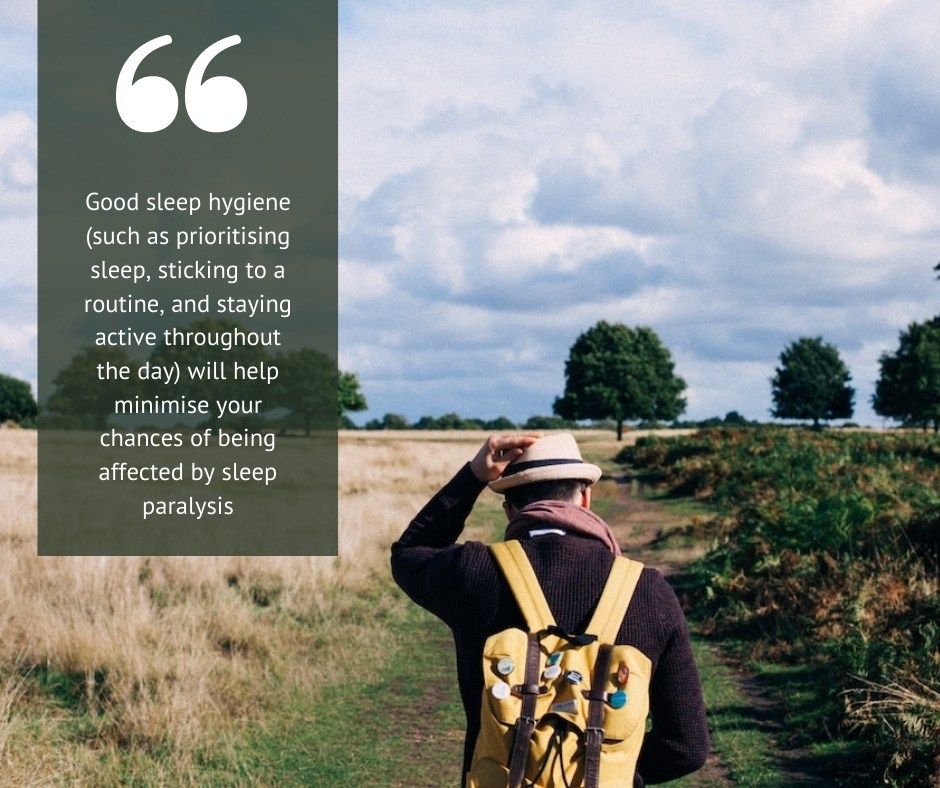Sleep paralysis: what causes it and how can we prevent it?
updated on Oct 13, 2022

What exactly is it, why does it happen, and what can we do about this mysterious sleep condition?
It’s the sleep condition that comes with a lot of fear attached, but what exactly is sleep paralysis? Well, it can be identified as a brief loss of muscle control, known as ‘atonia’, which makes you feel as though you are not able to move. This tends to happen just after falling asleep, or as you begin to wake, and it can fall into two categories: isolated (when the episodes are not regular, and are not linked to another underlying diagnosis) and recurrent sleep paralysis, which involves multiple episodes over a period of time.
An estimated 75% of people who experience sleep paralysis will also have hallucinations, which might feel different to, and more intense than, typical dreams. Generally, hallucinations during sleep paralysis fall into one of three categories: intruder hallucinations, where you might perceive danger or an unwanted presence; chest pressure hallucinations, where you may feel like you are suffocating; and vestibular-motor hallucinations, which can feel like movement, or an out-of-body sensation.
But what causes sleep paralysis in the first place? We asked Dr David Oyewole, consultant psychiatrist and medical director at Nightingale Hospital. “Sleep paralysis happens more frequently than commonly thought,” he says. “Some studies have shown about 30% of people have experienced at least one episode of sleep paralysis. In the general population though, it is thought to be closer to 8% having experienced an episode.
“People experience sleep paralysis when they become ‘partially awake’ while asleep. To explain, when in a stage of sleep associated with dreaming (rapid eye movement, or REM), the brain normally switches off, or reduces the ability of the body to move.
“However, some people become awake before the brain switches the body back to normal movement. If that happens, one then experiences being awake but not being able to move, which can understandably feel quite scary.”
There is a lot of fear around sleep paralysis, not least due to the fact it crops up in horror films – which are bound to keep you up at night, anyway. But the good news is that, as long as it doesn’t cause significant health problems, sleep paralysis is usually classified as a benign condition. That said, it can still affect your overall wellbeing. You might start to develop anxiety around sleeping, which can then lead to poor quality sleep, in turn affecting your health when you don’t wake up feeling rested.

So, what can cause sleep paralysis, and what can you do to help prevent it?
“It is known that stress and emotional challenges can increase the chances of sleep paralysis, as well as eating, drinking alcohol or coffee, or exercising just before bedtime,” Dr Oyewole explains. “Good sleep hygiene (such as prioritising sleep, sticking to a routine, and staying active throughout the day) will help minimise your chances of being affected by sleep paralysis.
“Avoid drinking alcohol or caffeine, eating, or exercising for four hours before bed. There’s also evidence to suggest you should avoid sleeping on your back.”
Having said this, Dr Oyewole notes that you should speak to a mental health professional to address any potential underlying problems, though he adds that many people who do experience sleep paralysis, tend only to have it for a limited time, and it often clears up without the need for professional intervention.
“Any mental health problem can increase the risk of sleep paralysis, but anxiety, PTSD, and obstructive airway sleep apnoea may be linked more than other conditions,” he adds. “It isn’t thought that sleep paralysis causes mental health problems, but more an indicator that there may be some already present.”
Although, if sleep paralysis is causing anxiety around sleeping, Dr Oyewole recommends taking time to understand what is happening physically in the body. If it becomes recurrent, however, you should speak to your GP.
“Being referred to a specialist, and then assessing or treating any underlying mental health disorder, is likely to be the next step and helpful in overcoming sleep paralysis,” he says. “A few people may need to see a specialist for their sleep paralysis, but be wary of unproven treatments or self-help methods that one can just find on the internet.”
So, while it’s not caused by ghosts or ghoulies, and most experiences are far too boring to warrant horror film-level reactions, if you’re troubled by sleep paralysis, reach out. Take some time to consider your overall wellbeing, and what you can do to support a strong foundation of self-care in your daily life. With time, you should be able to put this sleep condition to bed.
If you're feeling troubled by sleep paralysis and it's affecting your health, visit the Counselling Directory or speak to a qualified counsellor.

